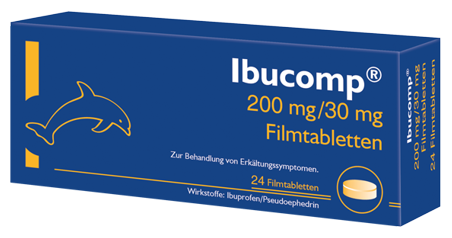Genericon
Genericon Ibucomp 24 tablets
Genericon Ibucomp 24 tablets
5.0 / 5.0
(1) 1 total reviews
Couldn't load pickup availability
Ibucomp contains the active ingredients ibuprofen, a non-steroidal anti-inflammatory drug (NSAID), and pseudoephedrine hydrochloride, which works to reduce swelling in the lining of the nose.
- Ibuprofen has a pain-relieving, decongestant and fever-reducing effect.
- Pseudoephedrine acts on the blood vessels in the nose to relieve nasal congestion.
Ibucomp is used for the symptomatic relief of nasal congestion accompanied by headaches and/or fever associated with influenza infections. Ibucomp is used in adults and adolescents over 15 years of age. Only use this combination medicine if you have both nasal congestion and pain or fever.
If you have only one of these symptoms, do not use this medicine. If you do not feel better or worse after 3 days with fever or after 5 days with pain, contact your doctor. If adolescents aged 15 and over need to take this medicine for more than 3 days, or if your symptoms worsen, you should see a doctor.
Contraindications
Ibucomp must not be taken
- if you are allergic to ibuprofen, pseudoephedrine hydrochloride or any of the other ingredients of this medicine (listed in section 6).
- during the last 3 months of pregnancy and while breastfeeding.
- if you have previously had an allergic reaction such as wheezing, worsening of asthma, itchy, runny nose, facial swelling or hives after taking acetylsalicylic acid (commonly known as aspirin) or other pain relievers, fever reducers or anti-inflammatory medicines to have.
- if you have or have ever had a stomach ulcer.
- if gastrointestinal bleeding has occurred in connection with previous treatment with non-steroidal anti-inflammatory drugs (NSAIDs).
- if you have ever had a brain haemorrhage (cerebrovascular haemorrhage).
- in case of severe liver or kidney disease.
- in severe heart failure.
- if you have severe heart problems, severe high blood pressure, a heart attack or circulatory disorders (chest pain).
- with hyperthyroidism.
- if you have a pheochromocytoma (a tumor of the adrenal gland).
- if you have high blood pressure that is not well controlled by treatment.
- if you have had a stroke or have been diagnosed with risk factors for a stroke in the past.
- if you suffer from angle-closure glaucoma (increased pressure in the eye).
- in unexplained disorders of blood formation.
- if you have had seizures in the past.
-
if you use the following medicines:
- other decongestants such as phenylpropanolamine, phenylephrine or ephedrine
- Methylphenidate (used to treat ADHD)
- Non-selective monoamine oxidase inhibitors (known as MAO inhibitors, which are used to treat Parkinson's disease or depression) - or if you have taken them in the last 2 weeks.
- if you have problems urinating due to prostate problems.
- if you suffer from a certain autoimmune disease (lupus erythematosus).
interactions
Ibucomp must not be taken if you are using the following medicines:
- Monoamine oxidase inhibitors (so-called MAO inhibitors, used to treat Parkinson's disease or depression) or if they have been taken in the last 2 weeks
- vasoconstrictive medicines used to treat congestion in the lining of the nose (e.g. phenylpropanolamine, phenylephrine or ephedrine taken by mouth or applied directly into the nose)
- methylphenidate (used to treat ADHD)
In particular, tell your doctor or pharmacist if you are taking the following medicines:
- other non-steroidal anti-inflammatory drugs (NSAIDs) including acetylsalicylic acid (commonly known as aspirin)
- other pain relievers or antipyretics and selective COX-2 inhibitors (such as ibuprofen, naproxen and diclofenac)
- Cardiac glycosides used to treat abnormal heart rhythms (eg, digoxin)
- Steroids used to treat pain, swelling, allergies, asthma, rheumatism and skin problems
- certain medicines used to treat depression (eg, lithium, imipramine, amitriptyline, and mianserin, SSRIs such as fluoxetine, paroxetine), monoamine oxidase A inhibitors (MAOIs) (eg, isocarboxazid, moclobemide)
- methylene blue (dye)
- Medicines that have an anticoagulant effect (ie thin the blood/prevent clotting, e.g. acetylsalicylic acid, warfarin, ticlopidine)
- Medicines used to treat high blood pressure (e.g. ACE inhibitors such as captopril, beta-blockers such as atenolol, angiotensin II receptor antagonists such as losartan)
- Medicines to temporarily suppress your immune system such as methotrexate (used for arthritis, psoriasis and certain cancers), cyclosporine or tacrolimus
- Medicines for heart rhythm problems, angina, heart failure (e.g. digoxin or quinidine)
- phenytoin (for epilepsy)
- appetite suppressant
- probenecid or sulfinpyrazone (used to treat gout)
- Sulphonylharnstoffe (Antidiabetikum)
- Medicines that promote urination (diuretics/water tablets, e.g. potassium-sparing diuretics)
- Medicines for migraines (such as ergotamine and triptans)
- zidovudine (used to treat HIV/AIDS)
- heparins (blood thinners)
- Trimethoprim, Linezolid (Antibiotika)
- cholestyramine (used to lower cholesterol, relieve itching of the skin and diarrhea); it should be taken 2 hours apart from ibuprofen, since the effect of ibuprofen is reduced by cholestyramine.
- Voriconazole and fluconazole (for fungal infections)
- pemetrexed (used to treat cancer)
- tenofovir (used to treat HIV infection and hepatitis B)
- Deferasirox (used to remove excess iron from the body)
After taking pseudoephedrine hydrochloride, an acute increase in blood pressure can occur during an operation. Therefore, stop treatment with Ibucomp a few days before a planned surgical procedure and inform your anesthesiologist (anaesthetist) or dentist. Some other medicines can also affect or be affected by treatment with Ibucomp. You should therefore always seek the advice of your doctor or pharmacist before using Ibucomp with other medicines.
application
Always take this medicine exactly as described in this leaflet or as your doctor or pharmacist has told you. Check with your doctor or pharmacist if you are not sure. Ibucomp is for oral use only.
The recommended dose is:
Adults and adolescents 15 years and older: 1 film-coated tablet, if necessary every 4-6 hours. For more severe symptoms, take 2 film-coated tablets, every 6-8 hours if necessary.
Do not exceed the maximum daily dose of 6 film-coated tablets.
Swallow the film-coated tablets with water.
The lowest effective dose should be used for the shortest time necessary to relieve symptoms. If you have an infection, consult a doctor immediately if symptoms (eg fever and pain) persist or worsen (see section 2).
Use in patients with hepatic impairment is not recommended.
Use in patients with impaired renal function is not recommended.
Use in children and adolescents
Ibucomp must not be used in children and adolescents under 15 years of age.
Duration of use
This medicine is for short-term use only. Take the lowest dose required for the shortest possible time to relieve your symptoms.
Adults
Do not take this medicine for more than 5 days.
Adolescents (15 to 17 years old)
Do not take this medicine for more than 3 days. If your symptoms persist or worsen, see a doctor.
side effects
Like all medicines, this medicine can cause side effects, although not everybody gets them.
Stop taking Ibucomp immediately and seek medical advice:
-
if you have signs of a severe allergic reaction:
- Difficulty breathing or swallowing
- swelling of the face, lips, tongue or throat
- Severe itching of the skin with hives
- severe skin rashes including blistering of the skin
- Palpitations associated with low blood pressure
-
if you have signs of gastrointestinal bleeding:
- bright red stools, black stools (tarry stools), vomiting blood or vomit that looks like coffee grounds
Not known (frequency cannot be estimated from the available data)
Sudden onset of fever, reddening of the skin or many small pustules (possible signs of acute generalized exanthematous pustulosis - AGEP) may occur within the first 2 days of treatment with Ibucomp. See section 2.
If you get these symptoms, stop taking Ibucomp and contact a doctor immediately.
Other side effects may include:
Common (may affect up to 1 in 10 people):
- Digestive disorders such as abdominal pain, indigestion, nausea, vomiting, gas, diarrhea, constipation, loss of appetite
Uncommon (may affect up to 1 in 100 people):
- Headache, dizziness, trouble sleeping, restlessness, irritability or tiredness
- visual disturbances
- Abdominal pain or ulcers in the gastrointestinal tract, sometimes with bleeding and perforation, worsening of colitis and Crohn's disease
- skin rashes
Rare (may affect up to 1 in 1,000 people):
- Tinnitus
- hallucinations
- Insomnia, nervousness, restlessness, tremors
- Kidney tissue damage, increased uric acid concentrations in the blood
- worsening of asthma
Very rare (may affect up to 1 in 10,000 people):
- Infectious inflammation, signs of meningitis (headache, fever, stiff neck)
- Blood diseases (anaemia, low number of white blood cells, platelets or granulocytes). The first signs of this are: fever, sore throat, superficial mouth ulcers, flu-like symptoms, severe exhaustion, unexplained bleeding from the nose and bruising
- severe allergic reactions
- psychotic reactions, depression
- Swelling (oedema), high blood pressure, palpitations, heart attack, heart failure
- Inflammation of the esophagus and pancreas, narrowing of the intestine
- Kidney failure or kidney damage
- liver dysfunction
- severe skin reactions
Not known (cannot be estimated from the available data)
- Dry mouth, thirst
- Possible triggering of an acute attack of glaucoma (increased intraocular pressure) in previously stressed patients
- chest pain, irregular heartbeat
- cramp
- Urinary retention, difficulty urinating, especially in patients with urethral and prostate problems
- stroke
- Inflammation of the large intestine due to insufficient blood supply (ischemic colitis)
- Decreased blood supply to the optic nerve (ischemic optic neuropathy)
- (temporarily) increased transaminases (specific laboratory values for examining the liver and heart)
- Sweat
- itching
- Rash, which may blister
- hives
- swelling of the skin
- A severe skin reaction known as DRESS syndrome can occur. The signs may include a rash, fever, swollen lymph nodes and an increase in eosinophils, a type of white blood cell.
- The skin becomes sensitive to light
A severe skin reaction known as DRESS syndrome can occur. Symptoms of DRESS include: a rash, fever, swollen lymph nodes, and an increase in eosinophils (a type of white blood cell).
composition
The active ingredients are:
200 mg ibuprofen and 30 mg pseudoephedrine hydrochloride (equivalent to 24.6 mg pseudoephedrine).
The other ingredients are:
Tablet core:
Anhydrous colloidal anhydrous silica, croscarmellose sodium, microcrystalline cellulose, anhydrous calcium hydrogen phosphate, magnesium stearate, corn starch.
Tablet coating:
hypromellose, macrogol (400), talc, titanium dioxide (E171), yellow iron oxide (E172).
Share


